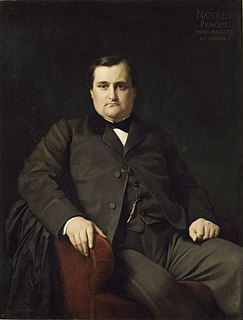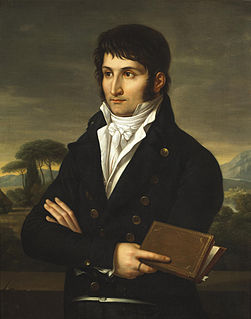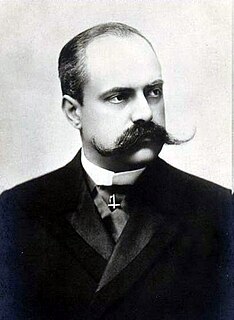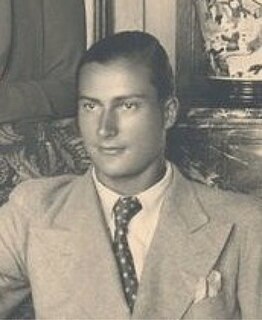
The House of Bonaparte is a former imperial and royal European dynasty of Italian (Genoese) origin. It was founded in 1804 by Napoleon I, the son of Genoese nobleman Carlo Buonaparte and Letizia. Napoleon was a French military leader who rose to power during the French Revolution and who, in 1804, transformed the First French Republic into the First French Empire, five years after his coup d'état of November 1799. Napoleon and the Grande Armée had to fight against every major European power and dominated continental Europe through a series of military victories during the Napoleonic Wars. He installed members of his family on the thrones of client states, expanding the power of the dynasty.
Napoleon (1769–1821) also known as Napoleon Bonaparte or Napoleon I, was a French military leader and emperor.

Jérôme-Napoléon Bonaparte was the youngest brother of Napoleon I and reigned as Jerome Napoleon I, King of Westphalia, between 1807 and 1813. Historian Owen Connelly points to his financial, military, and administrative successes and concludes he was a loyal, useful, and soldierly asset to Napoleon.

Elizabeth "Betsy" Patterson Bonaparte was an American socialite. She was the daughter of a Baltimore merchant, and the first wife of Jérôme Bonaparte, Napoleon's youngest brother.

Jérôme Napoléon "Bo" Bonaparte was a French-American farmer, chairman of the Maryland Agricultural Society, first president of the Maryland Club, and the son of Elizabeth Patterson and Jérôme Bonaparte, brother of Napoleon I.

Napoléon Joseph Charles Paul Bonaparte, usually called Napoléon-Jérôme Bonaparte or Jérôme Bonaparte, was the second son of Jerome, King of Westphalia, youngest brother of Napoleon I, and his second wife Catharina of Württemberg. An outspoken liberal, he became the de facto head of the House of Bonaparte from 1879 to his death. He was not considered a legitimate pretender to the throne by many Bonapartists, due to his father's previous marriage without divorce. They instead preferred his son Victor. From the 1880s he was one of the stronger supporters of General Georges Boulanger, together with other monarchist forces.

Princess Katharina Friederike of Württemberg was Queen consort of Westphalia by marriage to Jérôme Bonaparte, who reigned as King of Westphalia between 1807 and 1813.

Jerome Napoleon Bonaparte II was a French-American military officer who served in the United States Army and later in the French Army. He was a member of the American branch of the Bonaparte family.

Susan May Williams Bonaparte was an American heiress and the wife of Jérôme Napoléon Bonaparte, a French-American nephew of Napoléon I, Emperor of France, who lived as a farmer in Baltimore. Although nominally a princess, by virtue of her father-in-law being first King of Westphalia then Prince of Montfort, she and her descendants are not normally considered part of the Bonaparte dynasty.

Lucien Bonaparte, Prince Français, 1st Prince of Canino and Musignano, the third surviving son of Carlo Bonaparte and his wife Letizia Ramolino, was a Corsican-French statesman, who served as the final President of the Council of Five Hundred at the end of the French Revolution.

Bonapartism is the political ideology supervening from Napoleon Bonaparte and his followers and successors. The term was used to refer to people who hoped to restore the House of Bonaparte and its style of government. In this sense, a Bonapartiste was a person who either actively participated in or advocated for conservative, monarchist and imperial political factions in 19th-century France. After Napoleon, the term was applied to the French politicians who seized power in the Coup of 18 Brumaire, ruling in the French Consulate and subsequently in the First and Second French Empires. The Bonapartistes desired an empire under the House of Bonaparte, the Corsican family of Napoleon Bonaparte and his nephew Louis.

Victor, Prince Napoléon, titular 3rd Prince of Montfort, was the Bonapartist pretender to the French throne from 1879 until his death in 1926. He was known as Napoléon V by those who supported his claim.
Charles, Prince Napoléon is a French politician, and is the disputed head of the Imperial House of France and as heir to the rights and legacy established by his great-great-grand-uncle, Emperor Napoléon I. Other Bonapartists consider his son, Jean-Christophe, to be the current head of the house and heir.

Louis, Prince Napoléon was a member of the Bonaparte dynasty. He was the pretender to the Imperial throne of France, as Napoléon VI, from 3 May 1926 until his death on 3 May 1997.

Jean-Christophe, Prince Napoléon is the disputed head of the former Imperial House of France, and the disputed heir of Napoleon Bonaparte, the First Emperor of the French.

The Princes of Canino and Musignano formed the genealogically senior line of the Bonaparte family following the death of Joseph Bonaparte in 1844. The line was succeeded by one of Emperor Napoleon's younger brothers, Lucien Bonaparte. It became extinct in the male line in 1924. The dynastic Bonapartist pretenders descend in the male line from Prince Jérôme Napoléon, Napoleon's youngest brother.

The succession to the throne of the French Empire was vested in the descendants and relations of Napoleon I until the abolition of the Second French Empire in 1870.

Prince Jérôme Napoléon Charles Bonaparte was the son of Jérôme Bonaparte and a nephew of Napoleon I, Emperor of France, and army officer of the German kingdom of Württemberg.
Napoléon is the French form of the Italian given name Napoleone. Notable people with the name include:
Napoleon (1769–1821) was a French military leader and emperor.














